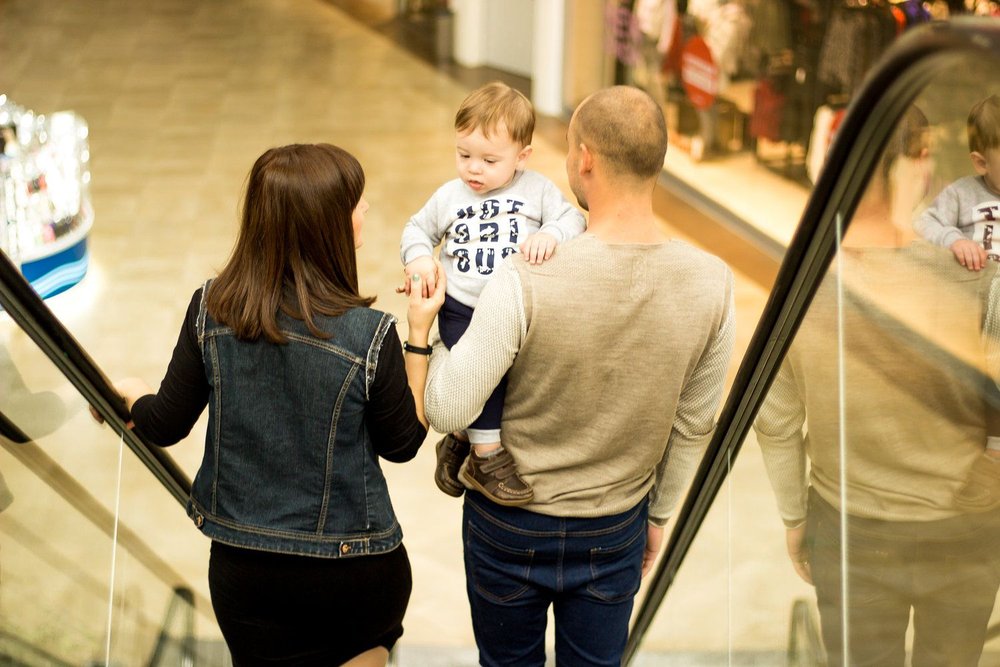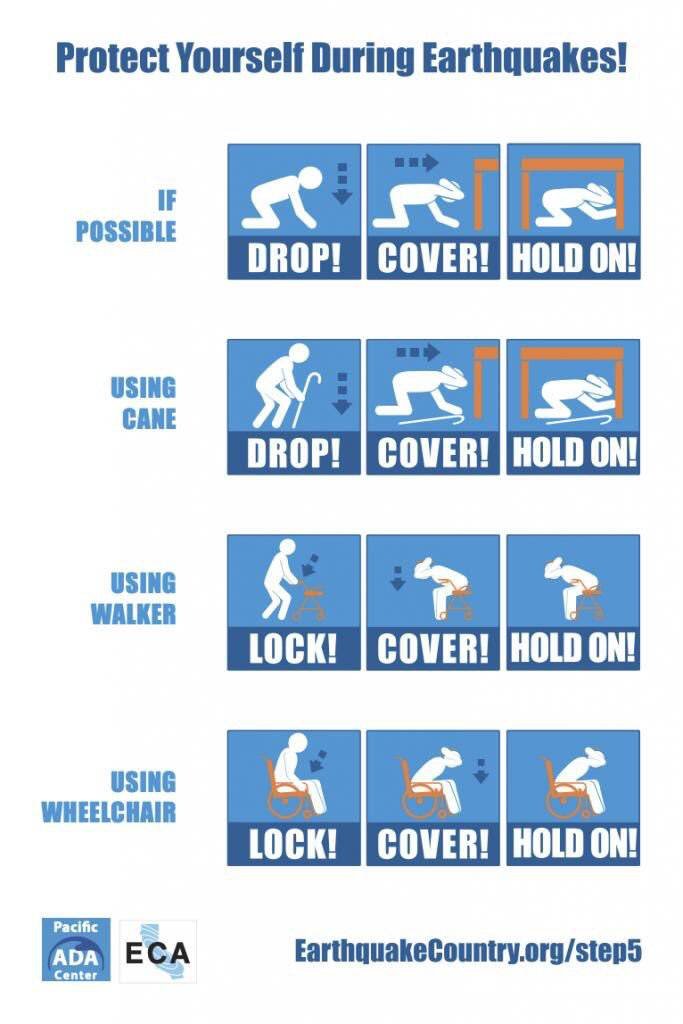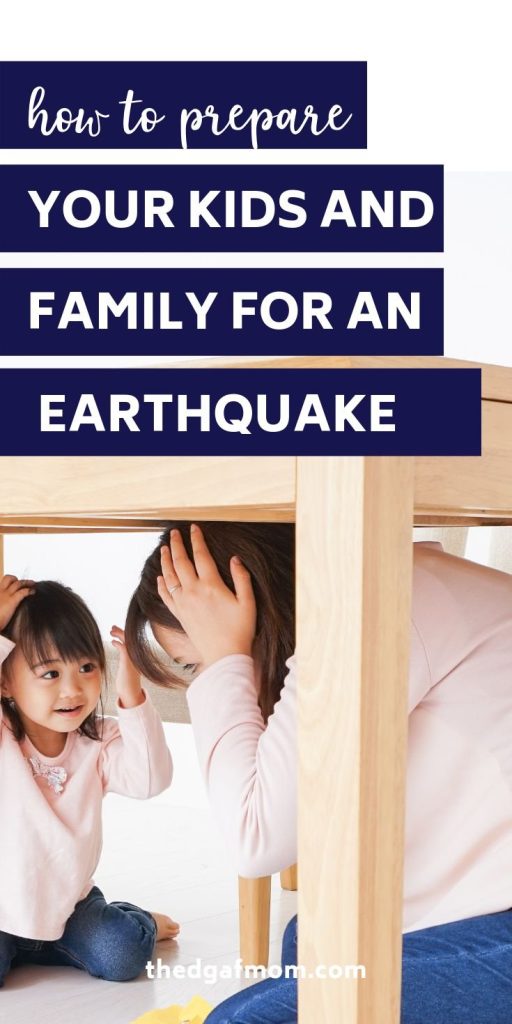In the past two days, we’ve had two very large earthquakes here in Southern California and if you’re like half of the state you’ve been searching for Earthquake what to do’s.
I just celebrated my 12 year anniversary of living on the west coast and I can say that the past two days produced the strongest and scariest earthquakes I’ve experienced…yet.
But because I am a DGAF mom, and a Floridian at heart, preparing for things like an earthquake (and a hurricane) is something that I come by pretty easily. And because I grew up in Hurricane country, I’ve been preparing my entire life for disaster.
Some of the links below contain affiliate linking, which means that at no extra cost to you, I may earn a commission if you click through and make a purchase. You can read my full disclosure policy here.
In 2017 I got my shit all the way together and invested in some core items that I feel confident about should the big one hit.
At the time, my kids were both two and under, so talking about earthquakes and preparing them for what’s to come was, idk. Hard to do.
Last night our house shook and swayed and creaked and my oldest screamed from his bedroom “thunder momma!” At the same time, my youngest was completely silent (we later watched him on the monitor playback and saw his fear instinct kick all the way in.
In some ways, I’m grateful that these have been really big (scary) earthquakes but without actual damage to our area because it’s giving us some real ways to define what it means to have the earth shake, and also helps us teach our kids what to do in an earthquake.
I’m heartbroken for the people who’s homes have been destroyed though. And grateful that our governor as activated emergency crews to help them.
Scientists are predicting that there’s an 11% chance of an even bigger quake to hit (and Dr. Lucy Jones – the break out star of this wave of earthquakes) has shared that there’s a 1 in 20 chance of an even bigger earthquake.
So what do you do when an Earthquake hits?
If you’re feeing the pressure of getting ready, do it now. Don’t delay. This is a real and present danger. If you’re afraid, if your kids are afraid, now is the time to take control and get all the way ready.
Get Prepared Now
Here in Southern California it can sometimes feel like the idea of the “big one” is just an idea. It’s not a tangible reality so we have a false sense of security that it’s not gonna happen…to us.
We haven’t felt the earth shake in a really long time (not like this) and we tend to have a short term memory about shit like this.
Except there’s always a threat of an earthquake (which scientists say over and over) but for some reason unless you’re confronted with the reality of it daily it’s not something that feels like it should be a priority.
You’re a busy parent. You’ve got work to do. You don’t have time to think about something that may or may not happen. Am I right?
If you freaking out because the world is shaking, use it to get ready now and don’t delay. Use the momentum of this fear to get ready so that even if “the big one” hits in three years, your shit will be all the way handled.
Last night a good mom friend, who was completely freaked out two giant earthquakes in two days (and usually very prepared for everything) headed to Walmart to update her kit and they were ALREADY SOLD OUT OF WATER.
Do not be like the rest of the city who is scrambling after the fact. Get ready now.
Here Are A Few Ways You Can Prepare for An Earthquake Right Now:
- Put a spare set of shoes in your nightstand and your kids night stands. If an earthquake happens at night and there’s broken glass throw your shoes on before you start walking around/evaluate the damage.
- Add ziplock bags of water to your freezer. (This is a hot hurricane tip) if the power goes out it will extend the life of your food in your freezer. You can throw the ziplock bags in the fridge too to keep things cooler longer there.
- Before you go to bed fill up your coffee maker with water, and any reusable water bottles in the event fresh water isn’t available in the morning (it’s an extra way to keep more water)
- Fill up pet bowls and spare water for them as well.
- Make sure you always have at least half a tank of gas should you need to evacuate (easier said than done, I know but try!) Check out this easily editable template to get organized for an Earthquake

A Quick Note About Storing Bottled Water
Bottled water traditionally has a limited shelf life (about 1 – 2 years depending on how thick the plastic is).
If you’re buying traditional bottled water (even the giant 5 Gallon jugs) you’ll need to replace them every year or two which can be a PITA but important.
Here’s some more information about the shelf life of bottled water.
Additionally, you’re going to want to store it just like it’s a food item – in a pantry or inside the air conditioned house. (Which I know is really hard when you’ve got a smaller space and not a ton of closet space. )
Also take into consideration that most plastic leach hormone-like chemicals into the water. No plastic bottles seem to be “safe” but opt for storage that limits exposure to extreme heat or cooling as that seems to help limit the amount of hormone chemicals being leached into the water.
As an alternative, opt for canned water that has a shelf life of 50 years, and can be stored in heat (read in your garage) without fears of leaching or chemicals.
(Keep reading for recommended water storage containers!)
Here’s a Helpful Earthquake List of Things You Need for Your Earthquake Safety Kit
Water (Invest in storage jugs and water purifying drops). For a family of four its recommended to have 12 gallons of water on hand to last you 3 days. The above linked water containers will give you 20 gallons of water and they have a 20 year storage shelf life so you can keep them on hand for years and not have to stress about running out of water.
In addition to (or instead of) Canned water (which has a longer shelf life and easier storage capacity)
Emergency food bucket (I like this one, the food ain’t bad either)
Multiple flashlights (and working head lamps – these are great!)
Loads of batteries!
Emergency Radio with hand crank and solar power panel.
Wrench to shut off gas line. And take a minute to familiarize yourself with how to do that.
Phone book of contacts.
Local maps.
Bottle Whiskey (your choice I don’t judge you and your Whiskey Choices)
Pen and pad of paper.
Dust masks for Adults.
Dust masks For kids.
Goggles for adults.
Toilet Paper
Contractor Trash Bags (they’re heavy duty and stronger than regular trash bags)
Sunscreen.
This one is great for the whole family:
Sunscreen sticks for kids faces:
Emergency Ponchos for the whole family:
Waterproof matches andhttps://amzn.to/2JfVviA
Secure heavy furniture to the wall (book cases, dressers) using this:
Secure pictures on the wall and items on tables/counters with Quake putty:
Be careful opening cabinets as things can shift and fall out.
Cash in small bills in a ziplock bag ( note how much on the outside)
Sharpies
Pen, paper, scissors
Stuff for kids…small games and books.
Pet food (we order an extra shipment every year and save an entire bag of food with our earthquake kit)
Pet carrier.
Medications (OTC including pain relief, anti-diarrhea medication, antacids or laxatives)
Paper plates, napkins, and utensils. A mess kit.
Here are some books to have on hand:
When The Grid Goes Down, Disaster Preparations and Survival Gear For Making Your Home Self-Reliant
A fireproof envelope for emergency documents. (we use this to keep birth certificates, social security cards, and any other important documents. When/if there’s a fire we grab it and go. If we’re not home, in theory, this will protect them.
An Emergency generator. (I’m personally very nervous about keeping a gasoline generator in earthquake territory (and fire territory) which is why I like these portable generators that you can attach a solar panel to)
Extension Cords if you have a Generator:
An extra large heavy-duty plastic bin to store all of it.
Hot tip: print out the above list and check off everything that’s in your kit. Slide it in a ziplock bag and affix it to your kit with duct tape.
Write the date of the last time you checked/updated things as well so you can remember/know what you have.
Here’s additional info from Ready.gov:

Pack and Prepare Earthquake Go Bags for You and the Kids
Go bags are an essential part of preparing for an earthquake and yet they often get overlooked.
A firefighter friend of mine told me recently that you need to know exactly where they are because it’s not the earthquake that you need to worry about, it’s the fires and flood after that are most dangerous.
If a fire is upon us we won’t have time to pack our bags.
In fact, we won’t have time to do shit. So having a bag that has a few essentials, changes of clothes, wipes, snacks, and safety items like flashlights mean all I have to do is grab my kid, their favorite lovey or toy, and get the fuck in the car and go.
My boys helped me pack their go bags today and what I realized going through all of it is that it had been two years since I updated them.
Set a calendar alarm on your calendar to switch out clothes and any other expired items in your earthquake kit twice a year (or if your kids are older, you can probably do it once a year)
I bought these super cheap backpacks but have since upgraded to older/bigger backpacks/diaper bags that can hold more stuff.
These are great to add to the car though for go bags:
Here’s what to include in your Earthquake go bags for you:
1 full change of clothes
Ziplock bag of money
Toiletries
Spare Glasses/contacts
Tampons/pads
Toothbrush and toothpaste
Flashlight (or headlamp or both)
Any emergency medicine (birth control etc)
Here’s what to include in your earthquake go bags for your kids:
One full change of clothes for each.
Diapers/wipes (if you have young kids) enough for 3 days of changes.
Creams, powders for baby
Medicine
Involve Your Children in the Process
As much as possible and if it’s age appropriate have your kids help you prepare the earthquake kit, go shopping for supplies, and pack go bags.
According to this article in the L.A. Times, giving your children something to do to help prepare empowers them and makes them feel less helpless.
Especially if they’re seeing disaster elsewhere.
My almost 5-year-old is fully aware of what happened and was thrilled to help me take stock of our earthquake kit today (and pack his go bag with a few new games and toys just in case).

How to Talk to Your Kids About An Earthquake (or Other Natural Disaster)
It’s important that you communicate with your kids that shit can happen that is out of your control.
In fact, that’s a good approach.
You can say something like “Sometimes there are things that happen that we have no control over. Like if and when it rains, or if it’s really hot. Earthquakes can be like this too which is why it’s important that we have a plan and get prepared so we know what to do when it does happen.”
Here’s a great video to show your kids about what an earthquake is to help explain it to them:
And yet another one:
My oldest loves to know everything about anything and the two of them watched these above videos and started telling me about how all the shaking was from the plates.
I’m the same way. The more that I can learn about something the more I feel empowered to feel safe and somewhat in control especially in a situation where I would have none. (which is a big part of why I write this blog).
Here are some recommended talking points via the American Academy of Pediatrics for how to model behavior to prepare your kids and for talking to your kids about natural disasters.
What to Do During an Earthquake (For You and Your Kids)
This morning we spent some time going through every single room and place in our house with the kids and practiced dropping down and covering.
Here’s a helpful video showing your kids what to do during an earthquake:
Let’s talk for a hot second about WHAT NOT TO DO.
Do not stand in a doorway.
DO NOT try to do the “triangle of life.”
Do Not run around your house, outside, inside. Or anything in between. (Here’s why – and other things you shouldn’t do)
Avoid windows and areas of your home where shit can fall off and land on you.
Get familiar with a plan for whatever may come.
What you should do: Stop. Drop. And Cover.
When the first earthquake hit I was standing in the bathroom next to our giant all-glass shower. Aka: the worst place to be in the house.
Thankfully, it was a light rolling earthquake, and I actually felt like I had gotten some sort of dizzy spell (and didn’t realize it was a quake till it was over and my kids and hubby ran upstairs to get me).
If your kids are in their beds teach them to stay there.
It’s actually a pretty safe place to be (omg please remove any pictures or signs hanging above your children’s bed or baby’s crib and do the same for your bedroom as well.)
When the second one hit my kids were both in their beds. My oldest had actually gotten up to get some more water but felt the room shaking and sat back down and started yelling from the fear and confusion of it.
On the video monitor, you can hear me yelling back at him from downstairs “get in your bed stay in your bed” and he did exactly that.
But he had forgotten the part where he needs to cover his head with a pillow.
Practice makes perfect.
Add “earthquake drills” to your calendar and start today while the idea of it is fresh in your head.
Be sure to discuss what to do when you’re at a restaurant, market, or at school.
Talk to your childcare provider and school about their earthquake plan.
If there’s a big sturdy table, get under that but practice holding onto one of the legs because that shit can move during an earthquake.
Here’s what to do during an earthquake from Ready.gov:

Jess Phoenix, a local vulcanologist and former candidate for the House of Representatives posted this super helpful video on Twitter today and it’s worth taking a look: (Uploading once she posts!)
Here’s another helpful video:
What to Do With Your Pets During an Earthquake
Just before the first earthquake hit on Thursday, my dog started running around our yard knocking shit over like he was spooked by something.
My husband even tried to get him to calm down.
Check out this post from Om Shanti Pups about How to Get Your Pets Through an Earthquake:
Helpful Apps and Experts to Keep Track of Earthquakes:
Make sure you have some apps on your phone to track the latest on earthquakes. Some are also in the process of developing technology to even give you a few seconds warning that a big one is coming.
I’ll be honest, some of them are glitchy af.
But, earthquake prediction is pretty near impossible at best. Although there are certainly some seismologists that do an excellent job of educating and warning.
I went ahead and downloaded every earthquake app that had more than 4 stars because I like to be extra.

Here are some great feeds to follow on Twitter as well for up to date information, predictions, and not-fear-mongering-news.

Channel Your Inner DGAF Mom
After an earthquake hits is the absolute worst time to be thinking about this shit.
You need to give some serious fucks about all of this right now so that you’re not the one running around Walmart or Target trying to get the last of the water, or first aid kits after an Earthquake.
Get serious.
Pack it all up, and then forget about it. (Except for when you check things twice a year).
But otherwise, hopefully, you’ll never have to use any of it. If/When you do have a serious earthquake you can feel confident that you have everything that you need, that you’re fully prepared, and that you and your family can survive.
Got any other helpful tips? Comment below!
Share the pin below on Pinterest or share the article on Facebook to spread awareness of what to do and how to prepare your family and kids during an earthquake.
Other Content from the DGAF Mom
Mom Hacks to Help You Get More Shit Done
How to Prepare To Go Back to Work After Baby
What To Make for Dinner When You Just Don’t Give a Fuck
How to Survive the 4th Trimester (Newborn Hacks You Need to Know)
Bye Bye Binky, How to Wean the Pacifier with No Tears and No Drama
How to Help Your Child Adjust to Daycare Without Drama

